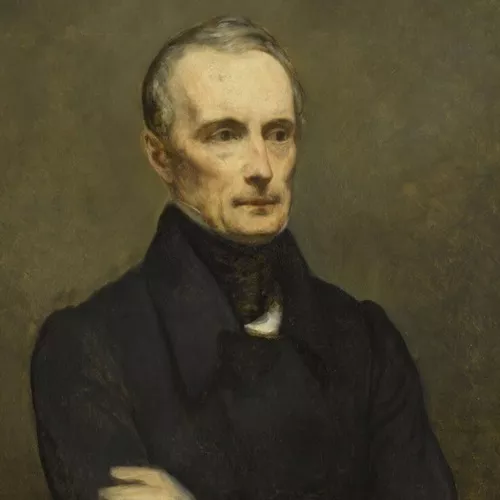
Alphonse de Lamartine (1790–1869) was a celebrated French poet, novelist, and statesman, renowned for his pivotal role in the Romantic movement. His deeply emotional works reflected a yearning for nature, love, and spirituality. Lamartine’s literary and political contributions earned him a lasting legacy as one of France’s most influential cultural figures of the 19th century.
Alphonse de Lamartine Biography
Alphonse Marie Louis de Prat de Lamartine was born on October 21, 1790, in Mâcon, France, into an aristocratic family. His upbringing was marked by a blend of traditional Catholic values and Enlightenment ideals, which shaped his worldview and future works. Lamartine was educated at the Jesuit college in Belley, where he developed a love for literature, particularly the works of Virgil and Rousseau.
Lamartine’s early adult life was defined by a pursuit of self-discovery. He traveled extensively through Italy, a journey that profoundly influenced his poetic imagination. His encounters with Italy’s natural beauty and cultural richness became recurring motifs in his poetry, often intertwined with themes of fleeting love and melancholy.
In 1820, Lamartine published his first poetry collection, “Méditations Poétiques”, which established him as a key figure in the Romantic movement. The collection’s poignant reflections on love, nature, and mortality resonated deeply with readers, earning him widespread acclaim. The Romantic ideals of emotional intensity, individualism, and a connection to nature became hallmarks of Lamartine’s style.
Despite his literary success, Lamartine was drawn to public life. He entered politics in 1833, becoming a member of the French Chamber of Deputies. His eloquent speeches and progressive ideals reflected his commitment to democracy, social justice, and peace. Lamartine was also an advocate for the abolition of slavery and a proponent of humanitarian reforms.
In 1848, Lamartine briefly served as the head of the provisional government during the French Revolution of 1848, championing the establishment of the Second Republic. However, his political career waned after he failed to win the presidential election later that year. Financial difficulties forced him to retire from politics and focus on writing.
Lamartine spent his later years penning historical works, memoirs, and poetry, although his financial struggles persisted. He died on February 28, 1869, in Paris, leaving behind a legacy as a Romantic poet and an idealistic politician who sought to harmonize art and humanity.
Alphonse de Lamartine Poems
Lamartine’s poetry is renowned for its lyrical beauty and philosophical depth. Below is a selection of his major works:
1. “Le Lac” (The Lake)
This iconic poem from Méditations Poétiques explores themes of lost love and the passage of time. Set against the backdrop of a serene lake, the poemcaptures the poet’s longing for a reunion with a departed lover.
2. “L’Isolement” (Isolation)
A meditation on solitude and existential despair, this poem reflects Lamartine’s introspection and connection to nature as a source of solace.
3. “L’Immortalité” (Immortality)
This poem delves into spiritual and philosophical questions, expressirng a belief in the eternal nature of the soul.
4. “La Mort de Socrate” (The Death of Socrates)
A tribute to the philosophical ideals of Socrates, this poem coombines Lamartine’s Romantic sensibilities with classical themes.
5. “Les Préludes”
A contemplation of life’s transience and the inevitability of change, this poem exemplifies Lamartine’s ability to weave personal emotion witth universal truths
6. “Harmonies Poétiques et Religieuses”
This collection explores themes of faith, spirituality, and the sublime,showcasing Lamartine’s Romantic exploration of divine beauty.
7. “Jocelyn”
A novel in verse, this work blends narrative and lyricism to postray the struggles of a young seminarian torn between love and duty.
8. “La Chute d’un Ange” (The Fall of an Angel)
This epic poem explores themes of redemption and divine love, reflecting Lamartine’sengagement with Christian mysticism.
9. “Le Désert” (The Desert)
Inspired by Lamartine’s travels in the Middle East, this poem vividly depicts the stark beauty of the desert landscape.
10. “Le Retour” (The Return)
This nostalgic poem captures the emotional power of memory and thhe longing for home.
Alphonse de Lamartine Quotes
1.”Poetry is the echo of the human soul.”
2.”The heart has its own eternity.”
3.”Man is a fallen god who remembers heaven.”
4.”To love is to live twice.”
5.”Nature speaks to the soul in a language of its own.”
6.”The past is a mirror where the soul reflects.”
7.”True greatness is the ability to move the hearts of men.”
8.”Time is the river of human existence.”
9.”A nation is born not of blood, but of ideas.”
10.”In the depths of despair lies the seed of hope.”
Alphonse de LamartineFacts
1.Lamartine’s Méditations Poétiques marked the first great triumph of the French Romantic movement.
2.He was a contemporary of Victor Hugo and often compared to him for his Romantic sensibilities.
3.Lamartine is credited with popularizing the concept of lyricism in French poetry.
4.His political idealism led him to oppose the death penalty and advocate for universal suffrage.
5.He was deeply influenced by his travels, particularly to Italy and the Middle East.
6.Lamartine’s failed presidential campaign in 1848 left him deeply in debt.
7.He was nominated for the Nobel Prize in Literature in 1901, posthumously recognizing his literary influence.
8.Lamartine’s wife, Marianne, supported his literary endeavors, despite their financial struggles.
9.He was one of the first poets to blend personal emotion with universal themes, earning him the title “poet of the soul.”
10.The Lake of Bourget, immortalized in Le Lac, remains a popular literary pilgrimage site.
